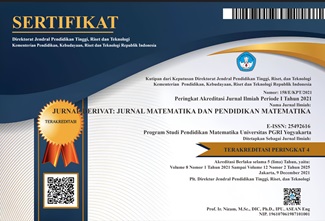Eksperimentasi Direct Instruction Dengan Giving Questions And Getting Answers Terhadap Kreativitas Mahasiswa Pada Matakuliah Statistika
DOI:
https://doi.org/10.31316/j.derivat.v1i2.110Abstract
Penelitian ini dilakukan dengan tujuan untuk mengetahui manakah pembelajaran yang menghasilkan kreativitas siswa yang lebih baik, pada siswa yang diajar menggunakan Direct Instruction dengan Giving Questions and Getting Answers atau Direct Instruction. Penelitian ini merupakan penelitian eksperimental semu. Populasi dalam penelitian ini adalah seluruh mahasiswa semester VI IKIP PGRI Bojonegoro tahun akademik 2012/2013. Pengambilan sampel dilakukan dengan cara cluster random sampling, sehingga terambil 2 kelas yakni tingkat III-E yang terdiri dari 42 mahasiswa dan tingkat III-C yang terdiri dari 40 mahasiswa.
Hasil penelitian ini dapat disimpulkan bahwa siswa-siswa yang diajar menggunakan Direct Instruction dengan Giving Questions and Getting Answers menghasilkan kreativitas yang lebih baik daripada mahasiswa-mahasiswa dengan Direct Instruction.
Â
Kata kunci: Direct Instruction, Giving Questions and Getting Answers, kreativitas siswa.
Downloads
Published
Issue
Section
Citation Check
License
Authors who publish with this journal agree to the following terms:
-
Authors retain copyright and grant the journal right of first publication with the work simultaneously licensed under a Creative Commons Attribution-ShareAlike 4.0 International License that allows others to share the work with an acknowledgment of the work's authorship and initial publication in this journal.
- Authors are able to enter into separate, additional contractual arrangements for the non-exclusive distribution of the journal's published version of the work (e.g., post it to an institutional repository or publish it in a book), with an acknowledgment of its initial publication in this journal.
- Authors are permitted and encouraged to post their work online (e.g., in institutional repositories or on their website) prior to and during the submission process, as it can lead to productive exchanges, as well as earlier and greater citation of published work (See The Effect of Open Access).







